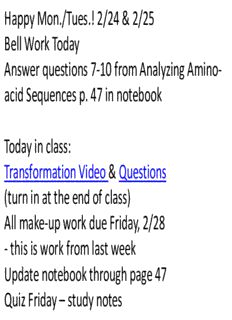
2/24 Bell Work Today Answer questions 7-10 from Analyzing Amino-acid Sequences Today in class PDF
Preview 2/24 Bell Work Today Answer questions 7-10 from Analyzing Amino-acid Sequences Today in class
Happy Mon./Tues.! 2/24 & 2/25 Bell Work Today Answer questions 7-10 from Analyzing Amino- acid Sequences p. 47 in notebook Today in class: Transformation Video & Questions (turn in at the end of class) All make-up work due Friday, 2/28 - this is work from last week Update notebook through page 47 Quiz Friday – study notes Happy Wednesday! • Bell work Week 8 Goes on page 49 Write four statements related to information presented in the video. Today in class: 1.2.3.4. 1. Review Amino acid TOC Update sequence 2. Popplett/WOD 46 Analyzing Amino-Acid Sequences 2/21 - 80 points 47 Second Page Questions 2/21 3. Horse Fossil Evolution 48 Video Questions 2/24 & 2/25 - Finish as HW if needed 4. Update NB 49 Bell Work Week 8 2/26 50 How Fossils Show Change 2/26 51 Horse Fossil Comparison 2/26 52 Evolution of the Horse 2/26 Happy Thursday! 2/27 Bell Work Week 8 – restate or copy 1. How many millimeters are in 3.7 cm? 2. Which horse has less bones in its foot? Use yesterday’s work. 3. Name another animal you think has probably changed over time and may have a fossil record to prove it. 4. Selection for traits may be natural or ________, typically promoted by man. TOC • 53 Notes Adaptations/Evolution 2/27 toad Adaptation: an anatomical, physiological or behavioral change that improves a population’s ability to survive and reproduce © A. Weinberg Have you ever wondered how animals are able to survive in the wild? Animals have certain adaptations that help them to survive. © A. Weinberg Think about the way you dress in the winter. You don’t wear your shorts and bathing suit when it’s snowing outside! You wear warm clothes, and maybe even a hat and mittens to protect yourself from the weather. © A. Weinberg And what if you are having a snowball fight? You probably run away from the person throwing at you, and maybe even try to sneak up on that person and throw some snowballs! © A. Weinberg The way you dress in the winter, as well as the way that you run and hide from someone throwing snow at you are kinds of … Adaptations. © A. Weinberg We can separate adaptations into two categories: A D Physical A P T AND A T I Behavioral O N S © A. Weinberg
Description: